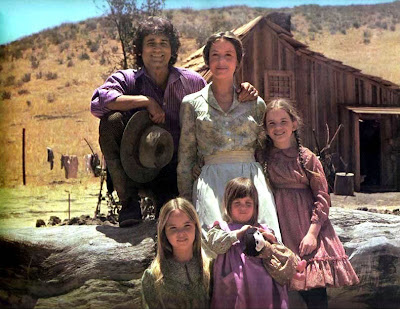 For those of you who grew up not knowing Laura Ingalls and her family, well, here they are! The barn in the background of this picture is not unlike the very barn I had imagined while reading Freeman's "The Revolt of Mother."
For those of you who grew up not knowing Laura Ingalls and her family, well, here they are! The barn in the background of this picture is not unlike the very barn I had imagined while reading Freeman's "The Revolt of Mother."On to Feminism. Both of the texts we read for today were clear arguments for women's rights, and I want to explore that idea further through examples that jumped out at me from the short stories themselves. While "The Revolt of Mother" was more of a warning to both the American government and society itself, Jewett's "A White Heron" promoted a woman's quest to discovering her own identity.
One of the moments in "The Revolt of Mother" that stuck out to me in particular was when Mother and her daughter were doing chores together, "Her mother scrubbed a dish fiercely. 'You ain't found out yet we're women-folks, Nanny Penn,' said she. 'You ain't seen enough of men-folks yet to. One of these days you'll find it out, an' then you'll know that we know only what men-folks think we do, so far as any use of it goes, an' how we'd ought to reckon men-folks in with Providence, an' not complain of what they do any more than we do of the weather.'" From just the simple act of scrubbing a dish fiercely, the reader is clued into the fact that this woman might not like the way things are, but she is grittin' her teeth and submitting anyways. Mother is using this conversation with her daughter to educate and warn her of the societal rules. Wives are not to question their husbands, and women are viewed on a lower level than men. Mother's own son had been aware of the building of the barn (FOR THREE MONTHS!) and didn't feel it necessary to clue his mother in on it. Even though this act would appear to be dishonest and sneaky in modern times, back then it was normal practice to make big decisions that concerning the welfare of the entire family without consulting the wife. Mother was fully aware of her duties.
We all know that this situation only lasted 40 years (ONLY), and eventually Mother snapped and took matters into her own hands. After a lifetime of servitude to a man who did not seem to value her opinion or desires, she made a life changing decision that could have been disastrous- Instead, Father found the error of his ways and recognized that her needs were just as important as his own. How ironic that the country was on the cusp of the Women's Suffrage movement, not quite ready to take the plunge, yet teetering on the edge of equality.
Jewett took a more subtle approach in "A White Heron," allowing the process of moral dilemma be the turning point for young Sylvia. Rather than revolt vocally against the hunter-man, she made an internal choice to omit information that would have allowed him to complete his mission of finding a white heron.
The first point I would like to make about the young man is that he treats these women just the same as the woman in Freeman's text. Upon his arrival, he was searching for a place to stay, and though it appeared to be a simple request, his demanding demeanor is a bit shocking (to me).
"Put me anywhere you like," he said. "I must be off early in the morning, before day; but I am very hungry, indeed. You can give me some milk at any rate, that's plain." It's not that he's unkind, and I realize that customs were different back then, but I do ask: would he have spoken this way if Sylvia had been living with her grandfather and not her grandmother?
As Sylvia embarks on her journey of enlightenment, she questioned his motives secretly: "Sylvia would have liked him vastly better without his gun; she could not understand why he killed the very birds he seemed to like so much." Though she was captivated by the young man, she had enough awareness to wonder whether his purposes were moral. She is very unlike Mother in her ultimate decision to remain silent, as she does not directly confront the hunter.
Are the messages the same in both of the texts? I would argue that they are in fact both in favor of feminism, however the push for gender equality is definitely more apparent in "The Revolt of Mother." One aspect of the story to consider is how long it took Mother to do what she did. She withstood the inequality for 40 years before she said something. Perhaps if she had experienced what Sylvia had when coming of age, she might have been enlightened enough and strong enough to realize her value sooner. Through "A White Heron," many messages can be conveyed concerning equality among all peoples, especially when Capitalist gains are in the picture.
So the final question is: money or piece of mind? I'll let you decide.
I thought the themes of equality were more easily identified in "The Revolt..." as well. The barn I envisioned was way, way bigger but I think the picture of the one you posted is probably a lot closer to what the author would have been talking about. I grew up in Walla Walla where all the barns are big enough to store combines, tractors, bailers, etc. When I read the story I actually wondered to myself how it was going to be possible to keep such a barn warm in winter. On the other hand, it seems like a fun way to live.
ReplyDelete